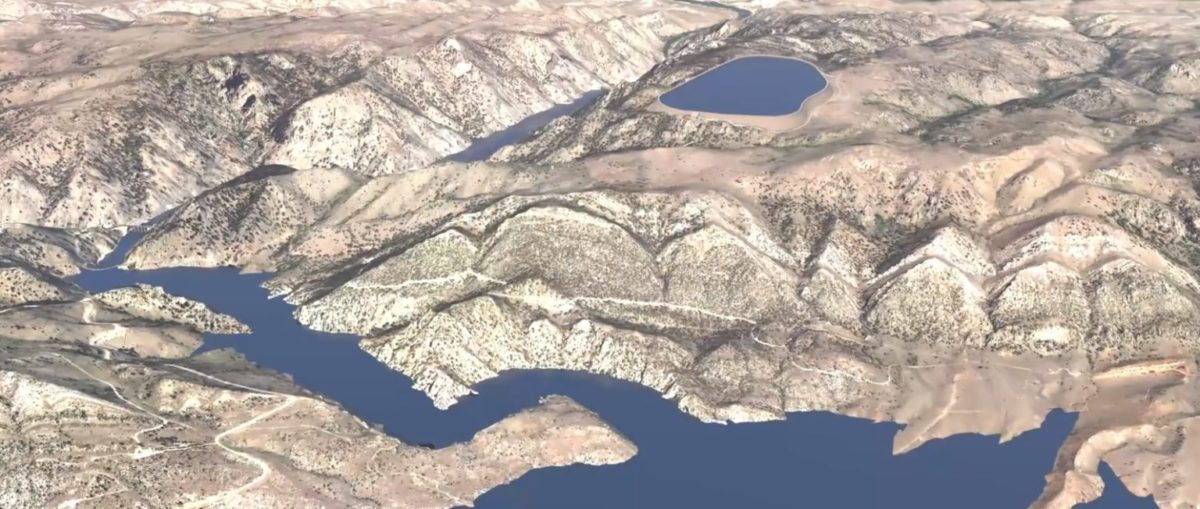From pv magazine USA
rPlus Hydro, LLP, a developer of large-scale pumped storage hydro projects, announced the submission of its application for Final License to the US Federal Energy Regulatory Commission (FERC) for its 900 MW Seminoe pumped storage project located in Carbon County, Wyoming. According to rPlus Hydro, this milestone has been achieved by only six pumped storage projects in the United States since 2000.
The Seminoe pumped storage project is expected to provide 10 hours of full-output energy storage capacity and will help ensure reliability and dependability of the regional transmission grid, especially as additional wind and solar capacity comes online. With an estimated construction cost of approximately $2.5 billion, the project expects to create up to 500 skilled construction jobs in Carbon County over four to six years. Once operational, the project will provide an estimated 35 full-time skilled positions to the area and generate approximately $9 million in additional annual tax revenue for state and local governments.
Pumped storage hydroelectric storage works by pumping water from a lower to a higher reservoir during off-peak periods. This can be at night or when there is too much electricity being generated, such as by solar during the day. When power is needed, stored water flows downhill through a turbine, and that energy is harnessed to produce electricity.
“Seminoe pumped storage will be an ideal match for Wyoming’s excellent wind energy resource, and will support Wyoming’s role as an energy leader,” notes Matthew Shapiro, rPlus Hydro CEO. “It can also help ensure efficient utilization of new transmission lines that are, or will soon be, under construction, such as the Gateway lines and TransWest Express.”
In the project’s design, the lower reservoir will be the existing Seminoe Reservoir. The upper reservoir will be located in the Bennet Mountains approximately 1.7 miles east of the Seminoe Dam, and approximately 1,000 ft higher in elevation than the Seminoe Reservoir. The two reservoirs will be joined by tunnels underground.
An underground powerhouse will contain equipment to generate electricity from the power of the water as it flows from the upper reservoir through the powerhouse and on to the lower reservoir. The same equipment would be used to pump water from the lower reservoir back to the upper reservoir, enabling the system to start the cycle again when needed.
Energy for pumping, and power generated by the project, will be delivered through a new, 30-mile transmission line connecting the project with PacifiCorp’s existing Aeolus Substation, near Medicine Bow, Wyoming.
Pumped storage has been in use for more than a century, and there are currently 43 such projects operating in the United States, according to rPlus. The submission of the Final License Application is the first of several major milestones for rPlus Hydro coming in 2023. rPlus Hydro anticipates final license to be granted by March 2025, construction to begin in October 2026, and commercial operation of the first unit by June 2031, with full operation by September 2031.
rPlus Hydro’s submission of its final license application is the culmination of a multi-year study and approval process that includes in-depth engineering designs, environmental assessments, and community engagement. The filing of this application will launch an environmental review and licensing process with local, state, and federal agencies.
The company expects to submit a final license application for its White Pine Pumped Storage project, a 1,000 MW project located in White Pine County, Nevada, in the coming months.
The final license application is available here.
This content is protected by copyright and may not be reused. If you want to cooperate with us and would like to reuse some of our content, please contact: editors@pv-magazine.com.




2 comments
By submitting this form you agree to pv magazine using your data for the purposes of publishing your comment.
Your personal data will only be disclosed or otherwise transmitted to third parties for the purposes of spam filtering or if this is necessary for technical maintenance of the website. Any other transfer to third parties will not take place unless this is justified on the basis of applicable data protection regulations or if pv magazine is legally obliged to do so.
You may revoke this consent at any time with effect for the future, in which case your personal data will be deleted immediately. Otherwise, your data will be deleted if pv magazine has processed your request or the purpose of data storage is fulfilled.
Further information on data privacy can be found in our Data Protection Policy.